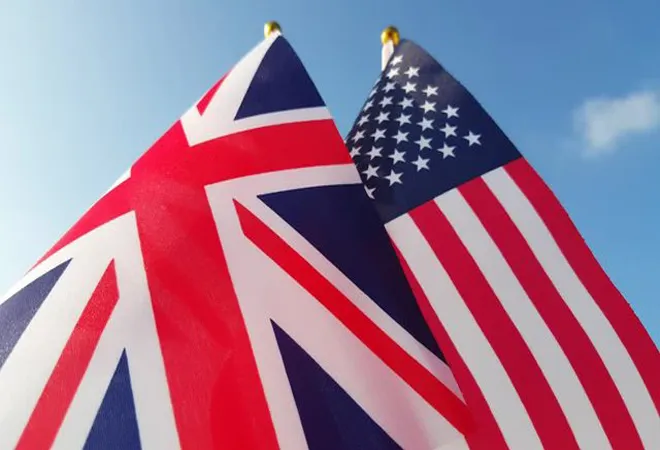
The United Kingdom Prime Minister Rishi Sunak and the United States (US) President Joe Biden on 8 June 2023 signed “The Atlantic Declaration: A Framework for a Twenty-First Century US-UK Economic Partnership”—during the latter’s visit to Washington. Declared as the first of its kind, the declaration and its action plans are
expected to promote a “new type of innovative partnership” to cover all areas of cooperation including technology, economy and trade. While deepening the trade and investment relations, the declaration is also expected to strengthen the UK-US cooperation in sectors like defence, health, space, and science. This article analyses the New Atlantic Economic Declaration and provides an assessment as to how it affects the partnership.
From Atlantic Charter to New Atlantic Economic Declaration
The core ideals of the UK-US relations can be traced back to the
Atlantic Charter of 1941 which was signed by Winston Churchill and Franklin Roosevelt. This Charter set out their common goals for the post-war world and laid foundation for their “special relations”. In June 2021, Prime Minister Boris Johnson and President Joe Biden signed what was called a “
New Atlantic Charter”. This new charter, recognising that the world has changed in the past 80 years, recommitted the partners to cooperate on both the older commitments including democracy, rule of law, etc., and on the new challenges such as climate change, cyber security, and health security.
While deepening the trade and investment relations, the declaration is also expected to strengthen the UK-US cooperation in sectors like defence, health, space, and science.
Prime Minister Rishi Sunak and President Biden signed a renewed economic cooperation pact called “The Atlantic Declaration”. The
new declaration highlights that the nature of national security is changing with economics and it is becoming more intertwined. The US and the UK are facing new international challenges including from “authoritarian states” such as China and Russia; along with disruptive technologies, non-state actions and transnational issues like climate change. To deal with the emerging challenges, both countries have worked together to strengthen their resilience in trade and technology; and cooperated to expand the scope of their defence, security, and intelligence relations. This has been achieved by their continuing support to Ukraine, strengthening NATO, implementing AUKUS—it is a trilateral security pact between Australia, the United Kingdom, and the US—and advanced coordination under the US-UK Indo-Pacific Dialogue.
This new economic declaration will
work towards reducing strategic dependencies as well as to building resilient, secured, and diversified supply chains. The focus will also be on critical and emerging technologies; exploring ways to deepen trade and investments; and strengthening the US-UK alliance in sectors such as science, health security, space, and defence. The
Action Plan for a Twenty-First Century U.S.-UK Economic Partnership (ADAPT) aims to spearhead the economic relations to reflect today’s challenges, and identifies five pillars of cooperation-
First, ensuring US-UK leadership in critical and emerging technologies—as these technologies are shaping national security—the emphasis is laid on innovative 5G and 6G solutions, artificial intelligence (AI), and collaborative Research & Development on semiconductors. To achieve these goals, the declaration calls for the mobilisation of private capital towards strategic technologies. To unlock this private investment, US-UK Strategic Technologies Investor Council will be established to bring together experts and investors from across the Atlantic to bridge the funding gap.
The focus appears to be on developmental set of controls on outbound investments and export controls in sensitive technologies along with building resilient semi-conductor and critical technology supply chains.
Second, advancing cooperation on economic security and technology protection toolkits and supply chains. The declaration identifies that many of the technology protection tools were designed for different time, technology and threats, hence, there is a need to update the current regulatory frameworks. US and UK will work to align their toolkits to “prevent the leakage of sensitive and dual-use emerging technologies, and other export-controlled commodities and technologies”. The focus appears to be on developmental set of controls on outbound investments and export controls in sensitive technologies along with building resilient semi-conductor and critical technology supply chains. It also calls for working towards strengthening of sanctions regime to tackle evasion and to jointly “jointly target those facilitating Russia’s illegal invasion of Ukraine in Russia, Belarus, and in third countries, including acquiring goods and technology that support Russian aggression”.
Third, partnering on an inclusive and responsible digital transformation. The focus is on the responsible development of AI, and coordination of their efforts through various international initiatives including Global Partnership for AI, and International Standards Organisations, as well as the G7 Hiroshima AI Process. The US also welcomed the UK’s plans to launch the first Global Summit on AI Safety, which will focus on bringing various stakeholders together to deliberate on safety and security of this technology, including the exploration of safety measures to monitor risks on AI. The takeaway from this was the plan to establish the US-UK data bridge to facilitate secure data flows between the two countries and ensuring privacy protection to accelerate cooperation on AI. Another initiative launched was collaboration on privacy-enhancing technologies which will help gain insights in responsible AI models to promote economic and societal benefits.
The focus appears to be on developmental set of controls on outbound investments and export controls in sensitive technologies along with building resilient semi-conductor and critical technology supply chains.
Fourth, building the clean energy economy of the future. The US and UK, while recommitting themselves to achieving their targets under the Paris Agreement, decided to launch negotiations for critical minerals agreement covering the five critical minerals
<1> important for electric vehicles, which can help UK businesses to get tax breaks under the Inflation Reduction Act. They also launched a one-year Joint Clean Energy Supply Chain Action Plan which will identify near-term actions that the US and the UK can take to accelerate capability building to meet clean energy demands in their countries as well as in the third country. They also launched a civil nuclear partnership, to be overseen by senior officials, for facilitating sustainable international deployment of advanced, peaceful nuclear technologies, including small modular reactors. This nuclear partnership is part of their larger efforts towards climate change and aims to develop new infrastructure and end-to-end fuel cycle capabilities by 2030 to reduce reliance on Russian resources.
Fifth, further strengthening our alliance across defence, health security, and space. Under this, the US and the UK would optimise their long-standing defence cooperation including in the AUKUS setting. The US has taken the initiative to add the United Kingdom as a “domestic source” within the meaning of Title III of the Defence Production Act—once added, this will help to further deepen the collaboration in defence industrial base of both countries and help in building new opportunities for US investments in multiple critical sectors. Both countries also will work towards strengthening health and biological security along with exploring cooperation across all sectors of space cooperation.
Assessment
The bilateral relations between Washington and London are
often called “special”, however, in the past few years the relations have been anything but. The relations had
hit a roadblock first with the positive Brexit vote and then with the Northern Ireland Protocol. Prime Minister Sunak, since taking office, has worked to remove the irritants in the relations including the Windsor Framework, to solve ongoing issues under the Northern Ireland Protocol and has also emerged to be one of the key supporters of Ukraine along with the US providing Kyiv with military and humanitarian aid. With this new Atlantic Declaration, both countries are stepping up their cooperation to set new standards of economic and technological cooperation.
Both countries also will work towards strengthening health and biological security along with exploring cooperation across all sectors of space cooperation.
This Atlantic Declaration has been pegged as first of its kind by the US and the UK and aims to make both countries ready to face the global headwinds. It represents the push by both countries to renew their partnership in a post-Brexit world. Recognising the nexus between economy, national security and technology, it aims to bolster US-UK cooperation in these critical sectors. While the economic outcome of the declaration appears to be long-term, the two sides are making an effort to show that their partnership is strong enough to take a leadership role in the wake of increasing Chinese aggressiveness as well as the conflict in Ukraine. This was visible in their emphasis in initiating conversations on critical technologies, AI, semi-conductors, civil nuclear agreement, critical minerals and defence cooperation.
Despite the US being the UK’s
largest trading partner in 2022 with 279.2 billion pounds, i.e. accounting for 16.3 percent of UK’s total trade volume. In 2021, UK’s
total investments in US stood at 461.4 billion pounds accounting for 26.1 percent of the total UK outward FDI stock; while US, for the same period,
invested 675.7 billion pounds accounting for 33.7 percent of the total UK inward foreign direct investment (FDI) stock. The declaration falls short of the expectation of a long-desired trade deal between the two countries. A goal which was also part of the Conservatives 2019 election manifesto. Instead it is a series of sector-wise initiatives ranging from defence procurement, data protection, and nuclear cooperation. In short, the declaration is a symbolic representation of the political will in both countries to work together on critical areas and make this alliance ready for the future.
Ankita Dutta is a Fellow with the Strategic Studies Programme at the Observer Research Foundation.
<1> Cobalt, Graphite, Lithium, Manganese, and Nickel
The views expressed above belong to the author(s). ORF research and analyses now available on Telegram! Click here to access our curated content — blogs, longforms and interviews.



 The United Kingdom Prime Minister Rishi Sunak and the United States (US) President Joe Biden on 8 June 2023 signed “The Atlantic Declaration: A Framework for a Twenty-First Century US-UK Economic Partnership”—during the latter’s visit to Washington. Declared as the first of its kind, the declaration and its action plans are
The United Kingdom Prime Minister Rishi Sunak and the United States (US) President Joe Biden on 8 June 2023 signed “The Atlantic Declaration: A Framework for a Twenty-First Century US-UK Economic Partnership”—during the latter’s visit to Washington. Declared as the first of its kind, the declaration and its action plans are  PREV
PREV


